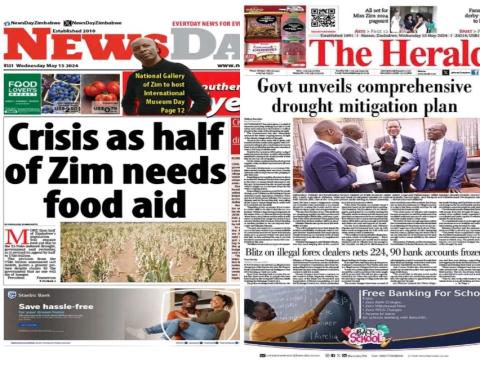Environmental journalism in a drought-stricken Zimbabwe
Submitted by fkakooza on

The government of Zimbabwe is heavily reliant on journalists to instill hope among citizens as thousands continue to starve due to an El-Nino induced drought that the country is currently contending with.
As the Zimbabwe African National Union Patriotic Front (ZANU PF) led government struggles to make strides in mitigating the drought, political concerns have emerged over the distribution of food aid and government's deliberate effort to instill 'false hope' among Zimbabweans.
Media houses in Zimbabwe are at the center stage of this political conflict and are torn between defending the government and upholding the journalistic principle of truthfulness. There is a notable disparity in drought reports done by privately owned media houses and state-owned media houses and journalism principles are at stake among the latter.
Silas Nkala, a reporter with a privately owned daily Newsday, says private media has exposed several issues such as the politicising of food distribution by government officials, dry water sources and death of domestic animals due to drought.
"Private media has exposed the number of people who are facing starvation in Zimbabwe to be over 2 million out of the 15 million that the country has. It has also exposed the politicization of food distribution mostly by the ruling Zanu PF government officials. It has also reported on the environmental issues such as drying of water sources due to drought, death of domestic animals due to drought, environment violation and degradation," he says.
On the other hand, Nkala says state owned media mainly carries the voice of government and shows efforts government is doing to mitigate the drought without showing how it has impacted the community.
"State owned media seem to be playing down issues by only at most carrying the voice of government officials and ruling political elites who only display their efforts and activities they are doing to mitigate the climate change and drought without pointing to the vagaries that these two phenomona have done to the lives of the people, wildlife, domestic life and vegetation," he says.
Timothy Nkomo, a Zimbabwean news consumer says state owned media such as The Herald focus on government interests which in this case is drought mitigation and food aid.
"The Herald talks about what the president is doing, what he has promised and what aid the government has got leaving out the stories of people out there who are starving because they don't have food in their homes," he says.
Different story angles
On Wednesday, May 15th, 2024, The Herald and Newsday run different lead stories from a post cabinet briefing that was held in Harare on May 14th, 2024.
The state-owned Herald had its lead story titled 'government unveils comprehensive drought mitigation plan' while Newsday had 'Crisis as half of Zim needs food aid' as its lead story. The two stories are a representative trend of the differing interests of Zimbabwean media with state owned media being defensive while private owned media is willing to go bear knuckle.
Challenges
Silas Nkala says private owned media has limited funds to reach most of the places that have been badly hit by the drought and this limits their coverage. Despite this, he says they have done their best.
"Independent journalists in Zimbabwe only have limited resources to reach out the most remote areas where drought has serious effects but in case where they have managed to reach, people are willing to share their suffering and hunger," he says.
According to Nkala, ZANU PF led government whips the media to its interests explaining why the state-owned media to play to its tunes. He notes that even the private media attacks the government sparingly due to fear of losing licences and advertisers.
- 95 reads
